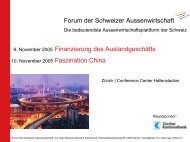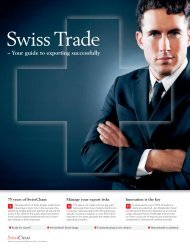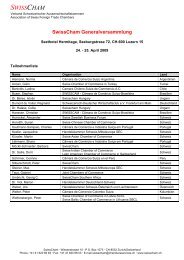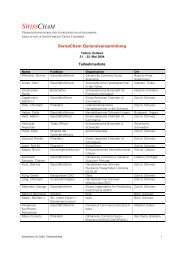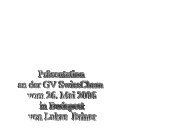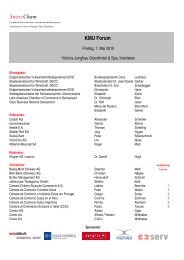Swiss Trade - SwissCham
Swiss Trade - SwissCham
Swiss Trade - SwissCham
- TAGS
- swiss
- swisscham
- swisscham.ch
Create successful ePaper yourself
Turn your PDF publications into a flip-book with our unique Google optimized e-Paper software.
8 <strong>Swiss</strong> <strong>Trade</strong> November 2010<br />
id currency. Furthermore it wields a purchasing<br />
power not to be underestimated:<br />
namely 200 million people”, says Christian<br />
Hanssen, president of the <strong>Swiss</strong>-Brazilian<br />
chamber of commerce (SWISSCAM).<br />
This new stability and purchasing power<br />
has triggered a dramatic increase in<br />
consumption.<br />
Food is a large part of this, of<br />
course, as well as white goods like<br />
television sets or fridges, energy,<br />
gas, oil, and infrastructure. In a<br />
growing economy demand rises,<br />
and Brazil’s 2010 growth rate is<br />
an impressive 7%.<br />
“One thing is very important,<br />
though, when you are interested<br />
in doing business in Brazil”,<br />
stresses Hanssen, “you should be<br />
able to fund the business venture yourself,<br />
because with an interest rate of 25%<br />
a year and inflation at 4% you cannot be<br />
dependent on Brazilian banks.”<br />
Malaysia, China and wider Asia<br />
One of the most important factors of<br />
<strong>Swiss</strong> export values<br />
19 %<br />
President Christian<br />
Hanssen, SWISSCAM<br />
breaking into a new market is being open<br />
to a different culture.<br />
“In Asia, Malaysia and Singapore<br />
are the countries with a<br />
mentality most similar to that<br />
of the west, due their history<br />
of being a British colony”, says<br />
Patrick Kriesemer, member of<br />
the Executive board<br />
at the <strong>Swiss</strong> Asian<br />
<strong>Swiss</strong>Cham members<br />
Local office<br />
Representation<br />
Chamber of Commerce<br />
(SACC), Chairman<br />
of the Malaysia<br />
and Brunei Commit-<br />
tee, and managing partner of<br />
Kriesemer & Partners. That<br />
makes doing business with<br />
them a little bit easier.<br />
Culture and ethnicity is very<br />
important in Asia; you have to know<br />
about the differences, especially if you<br />
hire local employees. There are certain<br />
positions that are traditionally filled<br />
by the Malay, Chinese or Indians, and<br />
Kriesemer is convinced that not playing<br />
Executive board member<br />
Patrick Kriesemer,<br />
SACC<br />
by the prevailing rules can cost you success.<br />
Of course, the product or<br />
service you are providing will be<br />
the decisive factor, but even the<br />
best product can fail if you are<br />
not playing the markets properly.<br />
Kriesemer recommends involving<br />
experts with a strong local<br />
network and who knows how to<br />
prepare a successful market entry<br />
into any Asian country.<br />
“You have to offer something<br />
unique but cannot ignore<br />
the culture and its local rules. Sell <strong>Swiss</strong><br />
Made quality with an Asian face, that’s<br />
how it’s done”, says Kriesemer.<br />
The <strong>Swiss</strong> Made label can turn out to<br />
be the key to success, especially for young<br />
SMEs, because a lot of positive attributes<br />
are associated with it; quality, precision<br />
and reliability, to take a few examples.<br />
Japan is still Switzerland’s most important<br />
trading partner in Asia with almost




